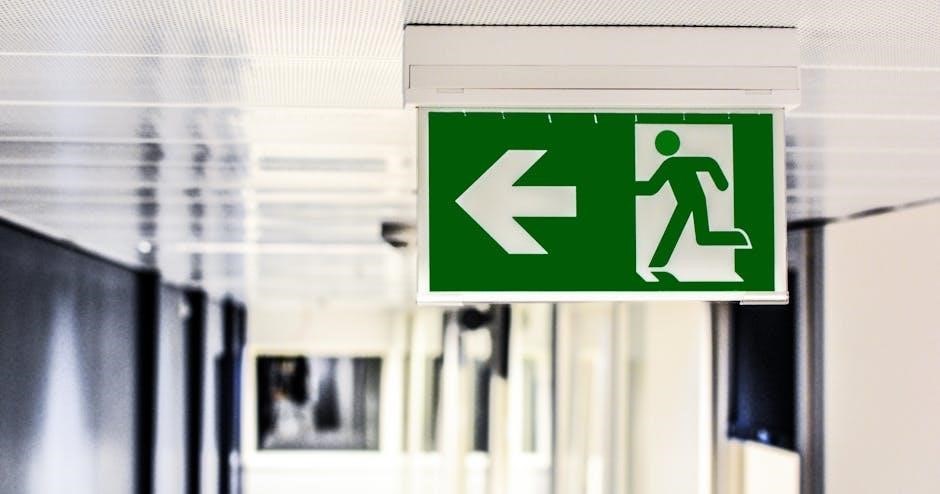
Notary services are essential for document authentication, ensuring legal compliance, and verifying identities. Notaries act as impartial witnesses, playing a crucial role in preventing fraud and upholding trust in legal processes.
1.1 What is a Notary and Their Role?
A notary public is an impartial official authorized to witness document signings, verify identities, and ensure signers act willingly. Their primary role is to prevent fraud by confirming the authenticity of signatures and the mental capacity of individuals involved. Notaries also handle tasks like acknowledgments and jurats, ensuring legal documents meet regulatory standards. By serving as a neutral third party, notaries uphold trust and integrity in various transactions, making them essential for maintaining the reliability of legal processes and protecting all parties involved.
1.2 Importance of Notary Services in Legal Processes
Notary services are vital for ensuring the authenticity and legality of documents. They prevent fraud by verifying signers’ identities and their willingness to sign, acting as an impartial witness. This validation ensures documents hold up in court, reducing disputes and legal challenges. Notaries also provide a safeguard against coercion or fraud, protecting vulnerable individuals. Their role is essential for maintaining trust and integrity in legal transactions, making them indispensable in various professional and personal matters.

Becoming a Notary
To become a notary, individuals must meet state-specific requirements, complete training, pass a certification exam, and undergo a background check to obtain a notary commission.
2.1 Requirements to Become a Notary Public
To become a notary public, candidates must meet specific state requirements. These typically include being at least 18 years old, residing in the state where they’re applying, and completing a background check. Additionally, many states require applicants to complete a notary education course and pass a certification exam. Some states also mandate a notary bond or insurance. Each state’s requirements may vary, so it’s essential to check local regulations before pursuing a notary commission. This ensures compliance and streamlines the application process.
2.2 Notary Training and Certification Process
The notary training and certification process involves completing a state-approved education course, which covers legal responsibilities, document handling, and ethical practices. After finishing the course, candidates must pass a certification exam to demonstrate their understanding of notary duties. Some states also require a background check and submission of fingerprints. Upon passing, applicants receive their certification, enabling them to perform notarial acts. This structured process ensures that notaries are well-prepared to serve the public effectively and maintain the integrity of legal documents. The certification is typically valid for a set period, after which renewal is required.
2.3 Obtaining a Notary Commission
Obtaining a notary commission involves submitting an application to the appropriate state authority, typically the Secretary of State. The process includes completing a state-approved training course, passing a certification exam, and undergoing a background check. Once approved, the commission is granted, authorizing the individual to perform notarial acts. The commission is usually valid for a specific period, after which renewal is required. This formal process ensures that notaries are qualified and accountable for their duties, maintaining public trust and legal integrity.
Essential Duties of a Notary
A notary’s primary duties include authenticating signatures, verifying document identities, and ensuring signers understand the document’s contents. They also maintain a record book for accountability and legal compliance.
3.1 Authenticating Signatures and Documents
A notary’s core responsibility is to authenticate signatures and documents, ensuring their legitimacy. This involves verifying the identity of signers through valid identification and confirming they understand the document’s contents. The notary also ensures the signer acts willingly without coercion. Once verified, the notary applies their official seal or stamp, certifying the document’s authenticity. This process prevents fraud and provides legal assurance, maintaining trust in the document’s integrity. Proper authentication is crucial for upholding the legal validity of agreements and transactions.
3.2 Verifying Identity and Wills
Verifying identity is a critical step in notarization, ensuring the signer is who they claim to be. Notaries use government-issued IDs to confirm identity and check for any signs of fraud. When handling wills, the notary must ensure the signer is mentally capable and acting voluntarily. Witnesses may also be required to validate the signer’s capacity. This process ensures legal validity and protects against disputes, maintaining the integrity of the document and upholding justice. Accurate verification is essential for safeguarding the rights of all parties involved.
3.3 Maintaining a Notary Journal or Record Book
Maintaining a Notary Journal or Record Book is crucial for documenting all notarizations. This journal should include details such as the signer’s name, document type, date, and a brief description of the transaction. Notaries must record each act to ensure accountability and prevent fraud. The journal serves as a legal record, aiding in investigations and disputes. Many states require this practice, and it is a key component of ethical notary conduct. Accurate and detailed entries protect both the notary and the signer, ensuring transparency and compliance with legal standards.

Handling Notarization Requests
Handling notarization requests involves verifying identities, ensuring document readiness, and adhering to legal procedures. Notaries must remain professional, detail-oriented, and prepared to facilitate smooth transactions.
4.1 Preparing for a Notarization
Preparing for a notarization involves several key steps to ensure efficiency and compliance. First, review the document thoroughly to identify all areas requiring notarization. Verify that the document is complete and unsigned, as signing must occur in the notary’s presence. Next, gather required identification such as a valid government-issued ID for each signer. Ensure your notary journal is ready to record the transaction, including details like names, document types, and dates. Additionally, confirm the type of notarization needed, such as an acknowledgment or jurat, and have the appropriate stamps and certificates on hand. Familiarize yourself with the document’s content to ask relevant questions and ensure the signer understands their commitments. Proper preparation prevents delays and ensures a smooth process.
4.2 Conducting the Notarization Process
During the notarization, begin by greeting the signer and verifying their identity using a valid government-issued ID. Ensure the signer understands the document and is signing voluntarily. Witness the signature, then confirm the document is complete and unsigned prior to the ceremony. For multiple signers, handle each individually, ensuring all parties are present. Maintain professionalism and avoid conflicts of interest. After witnessing the signature, affix your notary stamp or seal and complete the notarial certificate. Document the transaction in your journal, including names, document types, and dates. This ensures compliance and accountability.
4.3 Completing the Notarial Certificate
After witnessing the signature, you must accurately fill out the notarial certificate. This includes the date, location, and a statement acknowledging the signer’s identity and voluntary participation. Ensure all details are clear and legible. Sign and date the document as the notary, then affix your official seal or stamp. For multiple signers, complete a separate certificate for each. Double-check the certificate for accuracy and completeness before returning the document to the signer. Properly maintain a record of the transaction in your notary journal for future reference.

Best Practices for Notaries
Adhere to ethical standards, maintain impartiality, and ensure professionalism. Stay updated on laws and best practices to provide accurate, reliable, and unbiased notarial services at all times.
Notaries must uphold ethical standards to maintain public trust. This includes avoiding conflicts of interest, refusing bribes, and ensuring all signers are fully informed. Impartiality is crucial; never coerce signers or withhold services unfairly. Always verify identities diligently and follow legal procedures precisely. Keeping confidences and accurately recording transactions in a journal are also essential. Ethical practices protect both the notary’s reputation and the integrity of the legal process. Stay informed about ethical guidelines and seek legal advice if unsure about any situation. Avoiding conflicts of interest is vital for notaries to maintain impartiality and uphold ethical standards. A conflict arises when a notary has a personal or financial interest in the document’s outcome, potentially influencing their judgment. Notaries must refuse to notarize documents for family members, business partners, or situations where they stand to gain financially. Disclosing any potential conflicts and recusing oneself when necessary ensures compliance with legal and ethical guidelines. This prevents bias and protects the integrity of the notarization process. Maintaining professionalism as a notary is crucial for building trust and credibility. This includes presenting a neat appearance, being polite, and communicating clearly. Notaries should ensure confidentiality and avoid distractions during sessions. A well-organized workspace and prepared materials demonstrate competence. Time management and punctuality are also essential, showing respect for clients’ time. By adhering to ethical standards and staying informed about legal requirements, notaries uphold their role as trusted public officials. Professionalism fosters positive client interactions and supports the integrity of notarial services. Notarizations include acknowledgments, jurats, and specialized notarizations, each serving distinct purposes in verifying document authenticity and ensuring compliance with legal standards. An acknowledgment is a common notarization type where a notary confirms the identity of a signer and verifies that they have willingly executed a document. This process involves the notary witnessing the signature and confirming the signer’s understanding of the document’s contents. Acknowledgments are often required for deeds, powers of attorney, and other legal documents to ensure authenticity and prevent fraud. The notary’s role is to verify the signer’s identity and affirm their voluntary participation, providing a secure and reliable method for document authentication. A jurat is a notarial act that certifies the truthfulness of a written statement. Unlike an acknowledgment, a jurat requires the signer to swear or affirm the accuracy of the document’s contents under oath. This is typically used for affidavits, depositions, and other legal statements where truthfulness is paramount. The notary administers the oath, ensuring the signer understands the legal implications of their statements. Jurats provide an added layer of authenticity, as they involve a formal affirmation of truth, making them essential in legal proceedings and official documentation processes. Specialized notarizations cater to unique situations, such as electronic notarizations, remote online notarizations, and international documents. These processes often require additional certifications or tools, like digital signatures or video conferencing software. Specialized notarizations ensure compliance with specific regulations, such as those for digital records or cross-border transactions. They also include niche services like notarizing for ship captains or military personnel. These advanced procedures demand a deeper understanding of legal and technical requirements, making them a critical component of modern notary services. Advanced notary techniques involve mastering digital tools, handling multiple signatures, and streamlining processes for efficiency. These skills enhance service quality and adaptability in complex scenarios. Handling multiple signatures requires meticulous verification of each signer’s identity and their willingness to sign. Notaries must ensure all parties are present and aware of the document’s content. Organizing the process by managing documents in order and maintaining clear communication helps prevent errors. Using notary software can streamline the workflow, especially for complex transactions involving numerous signatories. Attention to detail is crucial to avoid legal disputes and ensure compliance with state regulations. Efficiency and accuracy are key when managing multiple signatures. Notarizing digital documents involves using specialized software to verify and secure electronic signatures. Ensure the platform meets state-specific regulations and offers two-factor authentication for security. Verify the signer’s identity remotely through video conferencing or digital ID verification tools. Attach a digital notary seal and retain records as required by law. This method streamlines the process while maintaining compliance with legal standards. Always follow best practices to safeguard sensitive information and ensure the integrity of the notarization process. Notary software streamlines tasks like document preparation, digital signatures, and record-keeping. It ensures compliance with state-specific regulations and enhances security. Many platforms offer templates for common notarizations, reducing errors. Advanced tools support remote notarizations and secure storage of completed documents. When choosing software, ensure it meets legal requirements and integrates with your workflow. Proper training on the platform is essential to maximize efficiency and maintain professionalism. Regular updates and technical support are also crucial for long-term reliability. Effectively market your services by building a strong online presence, leveraging SEO, and networking with local businesses. Offer exceptional service to attract repeat clients and referrals. Building a strong client base requires reliability, excellent service, and clear communication. Offer flexible hours and travel options to accommodate clients. Use online platforms to showcase reviews and testimonials, highlighting your professionalism. Engage with local communities through partnerships and events to increase visibility. Provide educational resources, like guides on notarization processes, to establish trust and authority in your field. Consistent follow-ups and personalized interactions can also foster long-term relationships, ensuring client loyalty and referrals. Promoting your notary services online is crucial for reaching a wider audience. Optimize your website with SEO strategies, including keywords like “notary near me” or “mobile notary services.” Use social media platforms to share updates and engage with potential clients. List your business in online directories like Google My Business and Yelp to enhance visibility. Leverage email marketing campaigns to keep clients informed about your services. Additionally, request online reviews from satisfied clients to build credibility and attract new customers through positive testimonials. Networking and partnerships are vital for expanding your notary business. Build relationships with local businesses, law firms, and real estate agencies to become their go-to notary. Attend community events and join professional associations to connect with potential clients. Partner with complementary services, such as mortgage brokers or attorneys, to offer joint solutions. Collaborate with other notaries to share resources and referrals. Leverage online platforms to form strategic alliances and promote your services collectively, ensuring mutual growth and increased visibility in the market. A notary’s role is critical in ensuring document authenticity and legal compliance. By mastering essential skills and adhering to best practices, notaries provide invaluable services to individuals and organizations. Continuous learning and adaptation to industry changes will ensure long-term success and relevance in this vital profession. To excel as a notary, prioritize ethical practices, maintain professionalism, and stay informed on legal requirements. Invest in quality tools like notary software to streamline tasks. Build a strong client base through excellent service and networking. Continuous learning is key to adapting to industry changes; Always verify identities thoroughly and keep detailed records. By following these tips, you ensure reliability and efficiency in your notary services, fostering trust and long-term success in your career. Continuous learning is vital for notaries to stay updated on legal changes, ethical standards, and emerging technologies. As laws evolve, staying informed ensures compliance and accuracy in your services. Engaging in ongoing education enhances your credibility and adaptability in an ever-evolving field. Regular training also helps you master advanced techniques, such as digital notarizations, and improves efficiency. By committing to lifelong learning, you maintain professionalism and provide exceptional service, keeping pace with industry demands and client expectations. This dedication fosters trust and long-term success in your notary career.5.1 Ensuring Ethical Practices
5.2 Avoiding Conflicts of Interest
5.3 Maintaining Professionalism

Common Types of Notarizations
6.1 Acknowledgments
6.2 Jurats
6.3 Specialized Notarizations

Advanced Notary Techniques
7.1 Handling Multiple Signatures
7.2 Notarizing Digital Documents
7.3 Using Notary Software

Marketing Your Notary Services
8.1 Building a Client Base
8.2 Promoting Your Services Online
8.4 Networking and Partnerships
9.1 Final Tips for Success
9.2 Importance of Continuous Learning